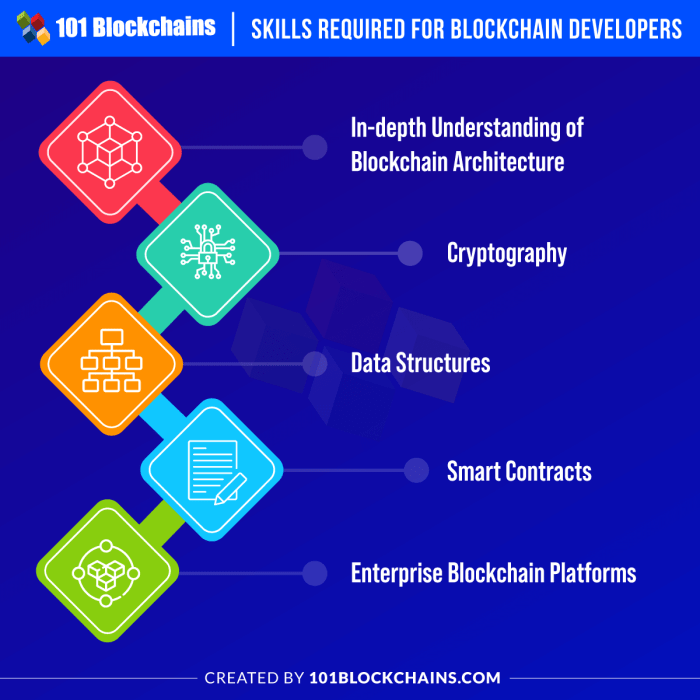Blockchain development tech career is more than just a buzzword; it’s a gateway to a future-proof career path within a rapidly growing industry. This revolutionary technology, with its decentralized and transparent nature, has disrupted various sectors, from finance to healthcare, and the demand for skilled blockchain developers continues to soar.
The world of blockchain development is filled with exciting opportunities, offering diverse career paths and a chance to shape the future of technology. From building secure and efficient smart contracts to designing innovative blockchain applications, developers play a crucial role in driving this transformative wave.
Blockchain Development Tech Career Overview

A blockchain development career is a rewarding path for tech enthusiasts seeking to contribute to the transformative world of decentralized technologies. Blockchain, at its core, is a distributed ledger that enables secure and transparent transactions across a network of computers.
Its applications extend beyond cryptocurrency, revolutionizing industries like finance, supply chain management, healthcare, and more.
Understanding Blockchain Technology
Blockchain technology is built on several fundamental principles:
- Decentralization:Blockchain networks are not controlled by a single entity, ensuring no single point of failure and promoting trust and transparency.
- Immutability:Once a transaction is recorded on a blockchain, it cannot be altered or deleted, creating a permanent and verifiable record.
- Cryptography:Blockchain utilizes sophisticated encryption techniques to secure transactions and protect data, ensuring authenticity and integrity.
- Consensus Mechanisms:Blockchain networks rely on consensus mechanisms, such as Proof-of-Work (PoW) or Proof-of-Stake (PoS), to validate transactions and maintain the integrity of the ledger.
The Role of Blockchain Developers
Blockchain developers are crucial in building and maintaining the infrastructure that powers blockchain applications. Their responsibilities encompass:
- Designing and developing smart contracts:Smart contracts are self-executing agreements written in code and stored on the blockchain, automating processes and eliminating intermediaries.
- Building decentralized applications (DApps):DApps are applications that run on blockchain networks, offering decentralized functionalities and enhanced security.
- Optimizing blockchain performance:Blockchain developers work to improve the scalability, efficiency, and security of blockchain networks.
- Integrating blockchain with existing systems:Blockchain developers bridge the gap between traditional systems and blockchain technology, enabling seamless data exchange and interoperability.
Real-World Blockchain Projects and Their Impact
Blockchain technology has already made significant inroads in various sectors, with notable projects demonstrating its potential:
- Ethereum:Ethereum is a popular blockchain platform that supports smart contracts and decentralized applications, enabling the development of innovative solutions across various industries.
- Hyperledger Fabric:Hyperledger Fabric is an enterprise-grade blockchain platform designed for secure and efficient data sharing and transaction processing within organizations.
- Ripple:Ripple’s blockchain network facilitates cross-border payments, enabling faster and more cost-effective transactions compared to traditional banking systems.
Skills Required for a Blockchain Development Career
To excel in blockchain development, individuals need a strong foundation in:
- Programming languages:Proficiency in languages like Solidity, Vyper, Python, and JavaScript is essential for developing smart contracts and DApps.
- Cryptography:Understanding cryptographic concepts like hashing, encryption, and digital signatures is crucial for ensuring blockchain security.
- Distributed systems:Knowledge of distributed systems principles and concepts is essential for building and maintaining decentralized applications.
- Blockchain frameworks:Familiarity with popular blockchain frameworks like Ethereum, Hyperledger Fabric, and R3 Corda is vital for developing real-world applications.
Essential Skills for Blockchain Developers
Blockchain development is a rapidly growing field with a high demand for skilled professionals. To thrive in this exciting domain, aspiring blockchain developers must acquire a diverse set of skills that go beyond traditional programming. This section delves into the essential skills that form the bedrock of blockchain development.
Programming Languages
Programming languages are the fundamental tools used to build blockchain applications. While the blockchain ecosystem embraces various languages, certain ones stand out as essential for developers.
- Solidity:Solidity is a high-level object-oriented programming language designed specifically for smart contract development on the Ethereum platform. It offers features like inheritance, libraries, and data structures, making it ideal for creating complex decentralized applications (DApps).
- Python:Python’s versatility and ease of use make it a popular choice for blockchain development. Its extensive libraries and frameworks, such as web3.py, facilitate interactions with blockchain networks and the creation of blockchain-related tools.
- JavaScript:JavaScript plays a crucial role in building front-end interfaces for blockchain applications. It is also used for creating decentralized applications (DApps) and interacting with smart contracts through libraries like Web3.js.
- C++:C++ is a powerful language used for developing high-performance blockchain platforms. Its low-level control and efficiency make it suitable for building core components of blockchain systems, such as consensus mechanisms and network protocols.
- Go:Go, also known as Golang, is a modern language known for its concurrency features and simplicity. It is widely used for building blockchain infrastructure and applications, particularly for high-throughput and distributed systems.
Cryptography and Consensus Mechanisms
Cryptography and consensus mechanisms are the pillars of blockchain security and integrity.
- Cryptography:Cryptography is the science of secure communication in the presence of adversaries. It involves techniques like encryption, hashing, and digital signatures to protect data from unauthorized access and manipulation. Blockchain developers must understand cryptographic concepts like asymmetric encryption, hashing algorithms (e.g., SHA-256), and digital signature schemes to ensure the security of their applications.
- Consensus Mechanisms:Consensus mechanisms are algorithms that enable a distributed network of nodes to agree on the state of a blockchain. They ensure that all participants have a consistent view of the blockchain’s history and prevent malicious actors from altering or tampering with the data.
Common consensus mechanisms include Proof of Work (PoW), Proof of Stake (PoS), and Practical Byzantine Fault Tolerance (PBFT). Understanding these mechanisms is crucial for designing secure and reliable blockchain applications.
Data Structures and Algorithms
Blockchain developers need a strong foundation in data structures and algorithms to optimize performance and efficiency.
- Data Structures:Data structures are fundamental ways of organizing and storing data. Blockchain developers use various data structures, such as linked lists, trees, and graphs, to efficiently manage the vast amounts of data stored on a blockchain.
- Algorithms:Algorithms are sets of instructions that solve specific problems. Understanding algorithms is essential for optimizing blockchain operations, such as transaction processing, consensus reaching, and data retrieval.
Smart Contract Development
Smart contracts are self-executing programs stored on a blockchain that automate agreements and enforce terms without the need for intermediaries.
Expand your understanding about peoplebrowsr founder awarded 15 million costs australian securities investment commission case with the sources we offer.
- Smart Contract Design:Smart contract development requires careful planning and design to ensure that the code is secure, reliable, and meets the intended functionality. This involves understanding the specific requirements of the application, choosing appropriate data structures, and implementing robust security measures.
- Smart Contract Security:Security is paramount in smart contract development. Developers must be aware of common vulnerabilities and implement best practices to prevent attacks like re-entrancy, integer overflows, and logic errors.
Blockchain Development Career Paths
The blockchain development field offers a wide range of career paths, each with its unique set of skills and responsibilities. Understanding these paths is crucial for aspiring blockchain developers to choose a specialization that aligns with their interests and strengths.
Career Paths in Blockchain Development
This section will Artikel different career paths in blockchain development, comparing and contrasting their roles and responsibilities, and providing insights into their average salaries and growth potential.
| Career Path | Roles and Responsibilities | Average Salary | Growth Potential |
|---|---|---|---|
| Solidity Developer | Develops smart contracts using Solidity, a programming language specifically designed for Ethereum. They write code to automate transactions, create decentralized applications (dApps), and manage digital assets. | $100,000
|
High, due to the increasing demand for Solidity developers in the rapidly growing blockchain ecosystem. |
| Blockchain Architect | Designs and implements blockchain solutions for businesses and organizations. They determine the architecture, protocols, and security measures for blockchain networks, ensuring scalability, performance, and reliability. | $120,000
|
Very high, as blockchain architecture is crucial for building secure and robust blockchain systems. |
| Smart Contract Auditor | Analyzes smart contracts for vulnerabilities and security flaws. They ensure that contracts are secure and function as intended, preventing potential exploits and protecting user funds. | $80,000
|
High, due to the increasing importance of security in the blockchain space. |
| Blockchain Developer (General) | Develops and maintains blockchain applications using various programming languages and frameworks. They work on diverse projects, including cryptocurrency wallets, decentralized exchanges, and supply chain management systems. | $80,000
|
High, as blockchain technology continues to evolve and find new applications across industries. |
Solidity Developer
Solidity developers are in high demand as they are responsible for building the core logic of decentralized applications on the Ethereum blockchain. Their role involves:
- Writing and deploying smart contracts using Solidity.
- Testing and debugging smart contracts to ensure their functionality and security.
- Integrating smart contracts with other blockchain components and applications.
- Staying updated with the latest Solidity best practices and security standards.
“Solidity developers are the backbone of the decentralized application ecosystem, as they build the foundation for secure and innovative applications.”
Blockchain Architect
Blockchain architects play a crucial role in designing and implementing blockchain solutions that meet specific business requirements. Their responsibilities include:
- Defining the overall architecture of blockchain networks, including consensus mechanisms, data storage, and security protocols.
- Selecting the appropriate blockchain platform and technologies for different use cases.
- Developing and implementing security measures to protect blockchain networks from attacks.
- Collaborating with developers and other stakeholders to ensure the seamless integration of blockchain solutions.
“Blockchain architects are visionaries who translate complex business needs into secure and scalable blockchain solutions.”
Smart Contract Auditor
Smart contract auditors are essential for ensuring the security and reliability of blockchain applications. They perform rigorous audits of smart contracts to identify vulnerabilities and potential exploits. Their responsibilities include:
- Analyzing smart contract code for security flaws, such as re-entrancy attacks, integer overflows, and logic errors.
- Documenting audit findings and providing recommendations for remediation.
- Collaborating with developers to address security issues and improve the overall security of smart contracts.
- Staying up-to-date on emerging security threats and best practices for smart contract auditing.
“Smart contract auditors are the guardians of the blockchain ecosystem, ensuring the integrity and security of smart contracts.”
Learning Resources and Education

Embarking on a blockchain development career requires a solid foundation in programming, cryptography, and blockchain technology. This section will guide you through the best learning resources and educational pathways to acquire the necessary skills.
Online Courses and Bootcamps
Online courses and bootcamps offer structured learning environments and practical training in blockchain development. Here are some reputable platforms:
- Coursera: Coursera provides a wide range of blockchain courses, including “Blockchain Fundamentals” by the University of California, Berkeley, and “Cryptocurrency and Blockchain Technology” by the University of Michigan.
- edX: edX offers courses like “Blockchain Technology: Principles and Applications” by MIT and “Introduction to Blockchain” by the University of California, Berkeley.
- Udacity: Udacity provides a comprehensive Nanodegree program in Blockchain Engineering, covering topics like smart contracts, decentralized applications, and blockchain security.
- Codecademy: Codecademy offers a beginner-friendly course on Blockchain Development, teaching the fundamentals of blockchain technology and how to build simple applications.
- Udemy: Udemy has a vast collection of blockchain development courses, ranging from introductory to advanced levels, covering various aspects of blockchain technology.
Importance of Certifications, Blockchain development tech career
Certifications in blockchain development demonstrate your knowledge and expertise to potential employers.
- Certified Blockchain Developer (CBD): Offered by the Blockchain Council, the CBD certification validates your understanding of blockchain fundamentals, consensus mechanisms, and smart contract development.
- Certified Ethereum Developer (CED): Provided by the Ethereum Foundation, the CED certification assesses your proficiency in Ethereum development, including smart contract programming and decentralized application development.
- Certified Blockchain Expert (CBE): Awarded by the International Blockchain Association, the CBE certification covers blockchain technology, applications, and regulatory frameworks.
Roadmap for Aspiring Blockchain Developers
To become a successful blockchain developer, follow this roadmap:
- Learn the Fundamentals: Start by gaining a strong understanding of programming concepts, data structures, algorithms, and object-oriented programming.
- Explore Blockchain Technology: Familiarize yourself with the basics of blockchain, including distributed ledger technology, consensus mechanisms, and cryptography.
- Master Smart Contract Development: Learn a smart contract programming language like Solidity, Vyper, or Rust, and practice building simple smart contracts.
- Build Real-World Projects: Create your own blockchain applications or contribute to open-source projects to gain practical experience.
- Stay Updated: Blockchain technology is constantly evolving, so stay up-to-date with the latest advancements and trends.
Current Trends and Future Outlook
The blockchain landscape is constantly evolving, with new trends and innovations emerging rapidly. Understanding these trends is crucial for blockchain developers to stay ahead of the curve and contribute to the growth of this transformative technology.
Impact of Emerging Trends
The impact of emerging trends in blockchain technology on the industry is multifaceted. These trends are driving innovation, expanding the scope of blockchain applications, and shaping the future of blockchain development.
- Interoperability: The ability of different blockchains to communicate and interact with each other is becoming increasingly important. This enables the seamless exchange of data and value across different platforms, fostering a more interconnected and efficient blockchain ecosystem. For example, the development of interoperability protocols like Polkadot and Cosmos allows different blockchains to operate as a unified network, enhancing their functionality and reach.
- Scalability: As blockchain adoption grows, scalability becomes a critical factor. Solutions like sharding, layer-2 scaling, and new consensus mechanisms are being developed to handle increased transaction volumes and improve network performance. For instance, Ethereum’s transition to Proof-of-Stake (PoS) is expected to significantly enhance its scalability and efficiency.
- Privacy and Security: The increasing focus on data privacy and security is driving the development of privacy-enhancing technologies like zero-knowledge proofs and homomorphic encryption. These technologies enable secure and confidential transactions while maintaining the transparency and immutability of blockchain data. For example, Zcash and Monero are cryptocurrencies that prioritize privacy and utilize advanced cryptographic techniques to ensure anonymity.
Blockchain Development in Various Sectors
The potential of blockchain development extends beyond cryptocurrency and is transforming various industries.
- Finance: Blockchain technology is revolutionizing the financial sector by enabling faster, more secure, and transparent transactions. Decentralized finance (DeFi) platforms offer innovative financial services, such as lending, borrowing, and trading, without the need for intermediaries. For example, platforms like Compound and Aave allow users to lend and borrow cryptocurrencies directly, earning interest or accessing capital without traditional banks.
- Healthcare: Blockchain can enhance patient data security, improve supply chain management for pharmaceuticals, and streamline healthcare processes. Securely storing and managing patient records on a blockchain can prevent data breaches and ensure patient privacy. For example, the MedRec project utilizes blockchain to store and manage patient medical records, ensuring data integrity and secure access for authorized individuals.
- Supply Chain: Blockchain’s transparency and immutability make it ideal for tracking goods and materials throughout the supply chain, reducing fraud, improving efficiency, and enhancing accountability. For example, Walmart is using blockchain to track its food supply chain, enabling faster identification of contaminated products and improving food safety.
Future Outlook
The future of blockchain development is bright, with immense potential to transform society.
- Decentralized Autonomous Organizations (DAOs): DAOs are organizations governed by rules encoded on a blockchain, enabling collective decision-making and ownership without central authority. DAOs are expected to disrupt traditional organizational structures and empower communities to collaborate on projects and initiatives. For example, MakerDAO is a decentralized organization that manages the stablecoin DAI, demonstrating the potential of DAOs to manage complex financial systems.
- Internet of Things (IoT): Blockchain can secure and manage data generated by interconnected devices in the IoT, creating a more secure and efficient network. For example, blockchain can be used to track and authenticate data from sensors in smart homes, improving energy efficiency and security.
- Metaverse: Blockchain technology can play a crucial role in the development of the metaverse, enabling secure and transparent ownership of virtual assets, facilitating decentralized governance, and fostering a more immersive and interactive digital experience.





